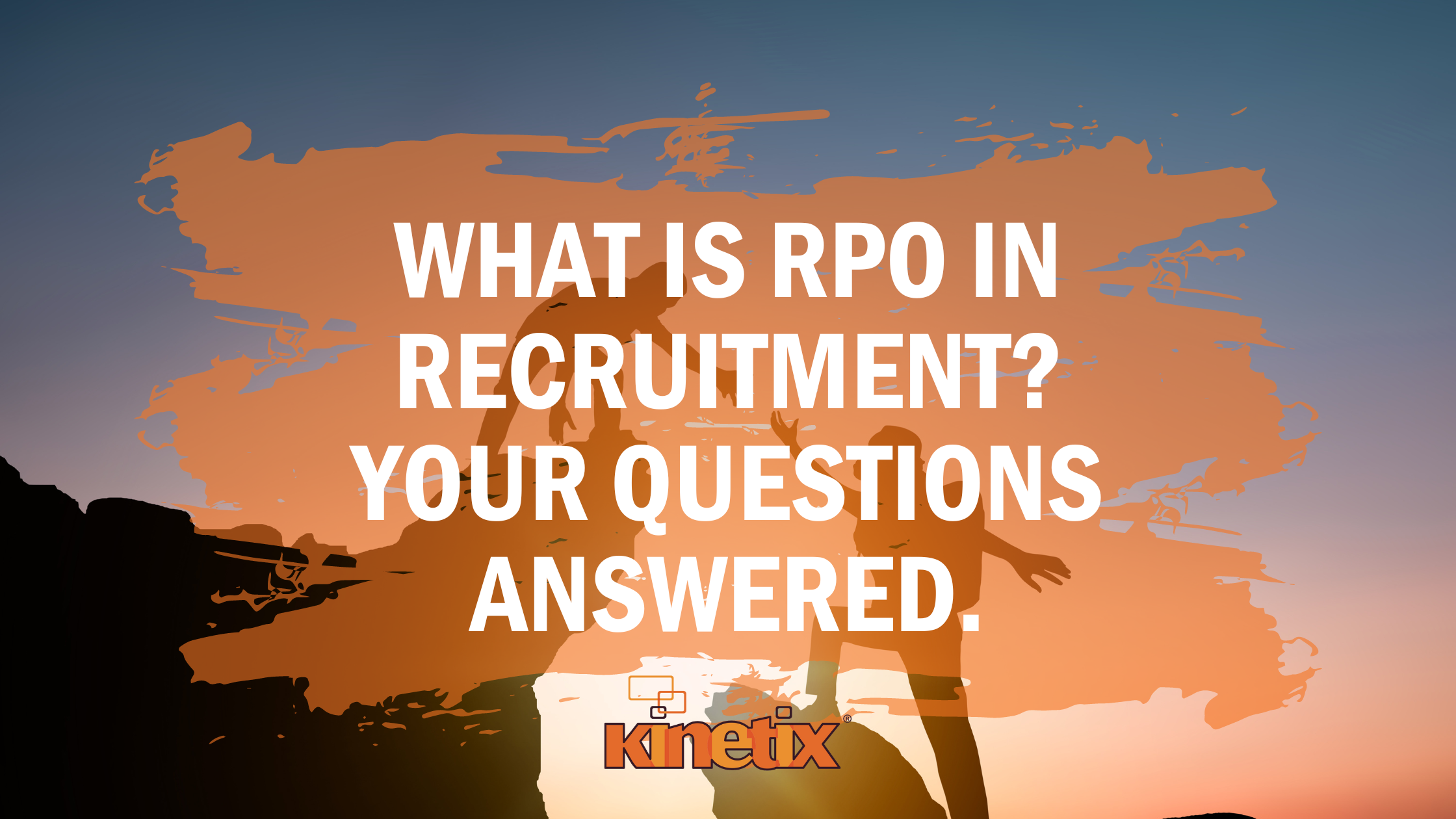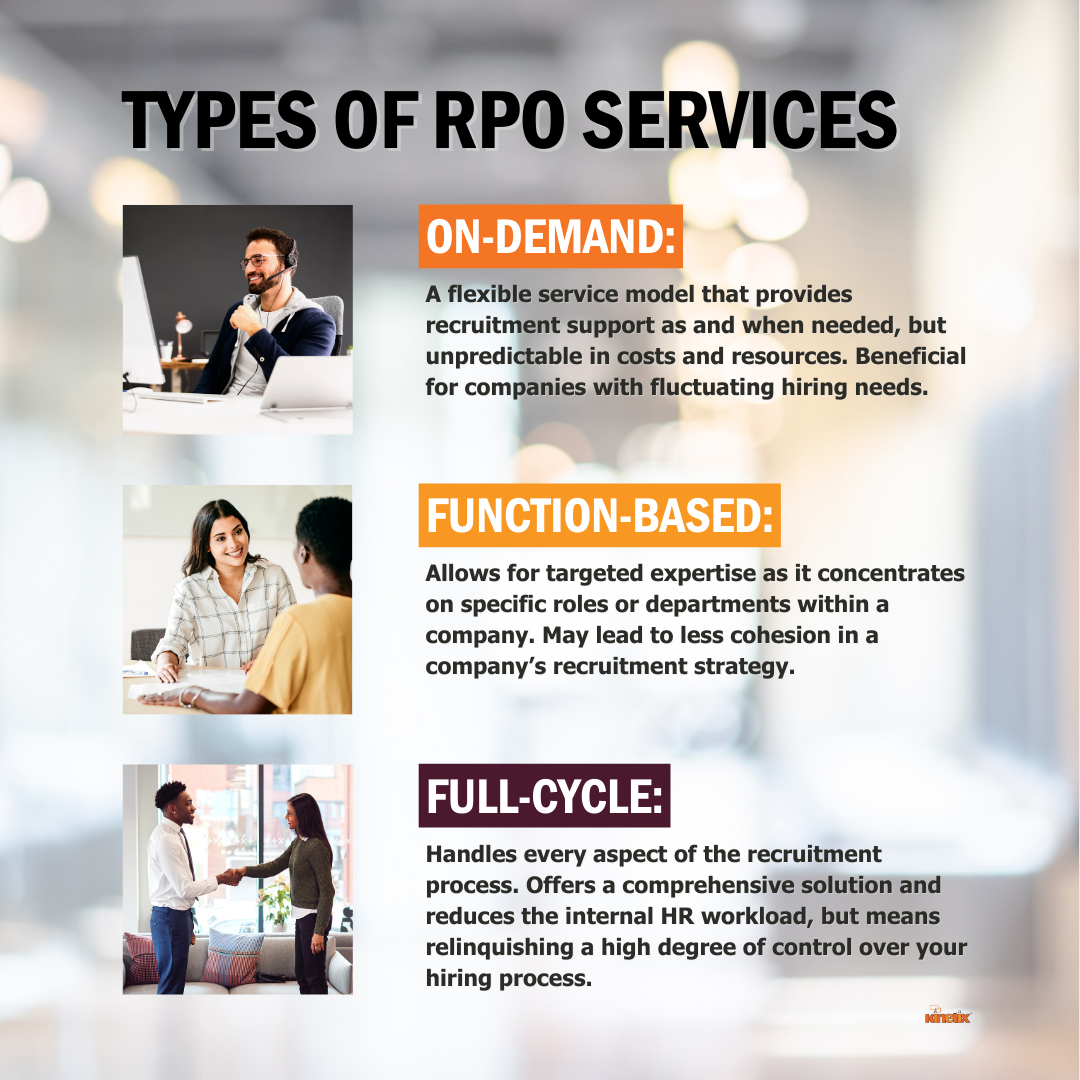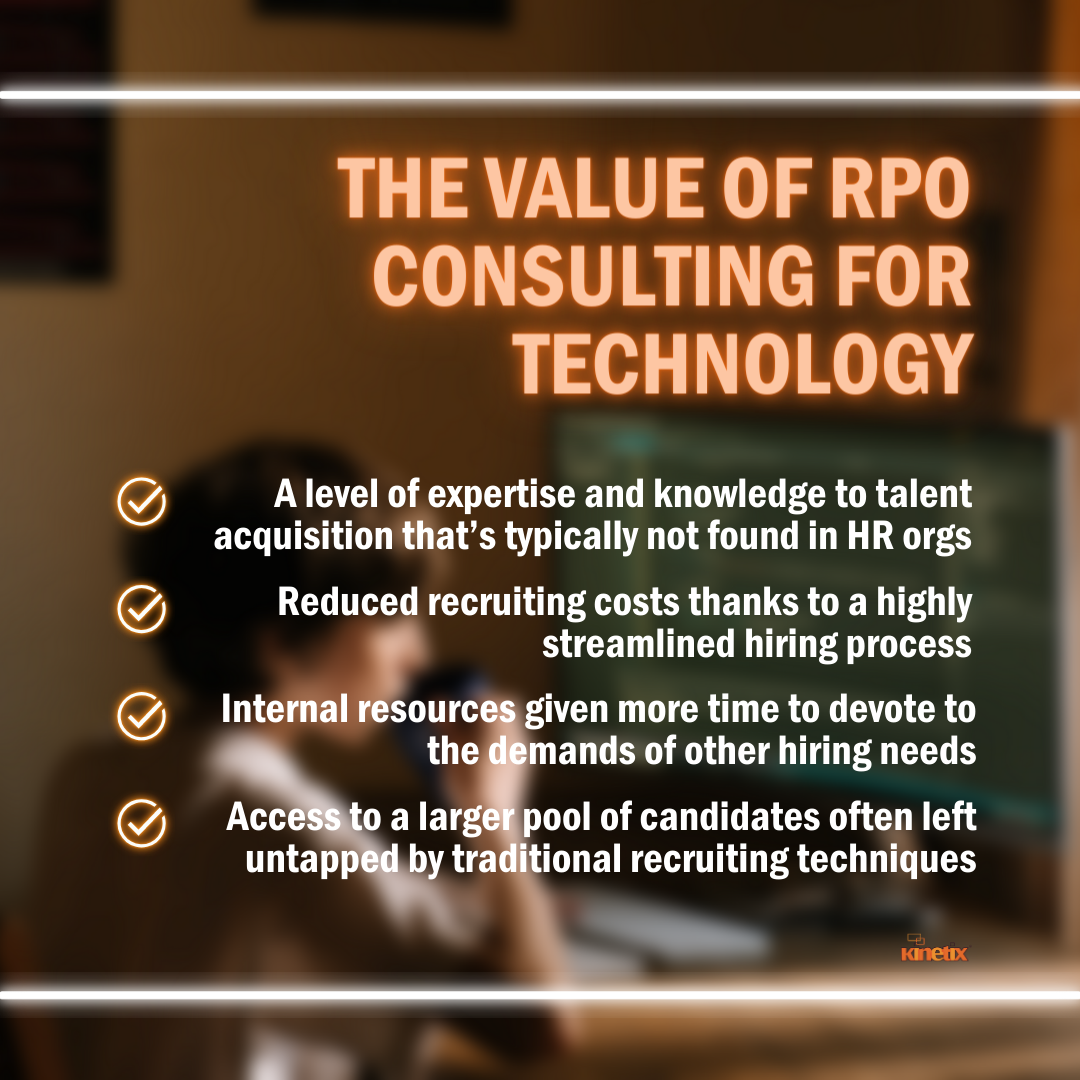
Table of Contents
- What is Talent Acquisition RPO?
- The Growing Demand for Outsourcing Talent Acquisition Through RPO
- Key Benefits of RPO Talent Acquisition Outsourcing
- Best Practices for RPO Engagements & Working with Outsourcing Partners
- Bolster Your Internal Recruiting Teams & Talent Acquisition Functions with Kinetix
In the evolving hiring and talent acquisition landscape, the term RPO, or Recruitment Process Outsourcing, has become increasingly prevalent.
But what exactly is RPO, and how can businesses benefit from it?
This article delves deep into RPO talent acquisition, exploring its myriad benefits and sharing best practices for successful implementation.
What is Talent Acquisition RPO?

Recruitment Process Outsourcing, commonly called RPO, is when a company transfers all or part of its permanent recruitment to an external provider.
Unlike traditional recruiting methods, RPO providers can manage the entire recruiting/hiring process or just select parts using their expertise, recruiting technology, and methodologies.
Historically, most businesses handled recruitment internally. However, with changing business needs and a growing emphasis on acquiring the right talent, the concept of RPO emerged as a strategic advantage. This approach focuses on outcomes, scalability, and flexibility, appealing to organizations looking for agile recruitment solutions.
The Demand for Outsourcing Talent Acquisition Through RPO

With industries evolving and the demands for specific skill sets becoming more niche, the recruitment needs of organizations have drastically shifted.
This has led to an unprecedented demand for outsourcing talent acquisition.
The Drivers Behind The Demand Surge
- Global Reach and Diverse Talent Pool: With businesses operating on a global scale, there's a need to tap into talent from different parts of the world. RPO providers typically have an expansive network and can source candidates from varied demographics and geographies.
- Specialized Skill Requirements: The need for niche skills grows as industries become more specialized. Traditional staffing methods might not always be equipped to understand or locate these specialized talents, but RPO providers often have the expertise to do so.
- Dynamic Business Needs: Companies are looking for flexibility. They might have bulk hiring needs today and require just a few strategic hires tomorrow. Outsourced talent acquisition can easily scale up or down based on these ever-changing requirements.
Shortcomings of Recruitment Agencies & Job Placement Companies
- Limited Network and Reach: Traditional agencies typically operate within a specific region or domain. This restricts their access to a broader talent pool, limiting the options available to employers.
- Generic Approach: Often, traditional agencies utilize a one-size-fits-all approach to recruitment. In contrast, RPO solutions can be tailored to a company's specific needs, ensuring a more precise and efficient hiring process.
- Lack of Advanced Tools: While RPO providers leverage the latest technologies like ATS, AI tools, and analytics for recruitment, many traditional agencies are still catching up. This technological gap can lead to slower, less efficient hiring processes.
- Inflexibility to Adapt: The recruitment landscape is changing rapidly. Traditional agencies, with their set methodologies, might find it challenging to adapt quickly to these changes. This can result in missed opportunities and outdated hiring strategies.
- Cost Implications: On the surface, traditional staffing might seem cost-effective. However, when you consider the time taken, potential for mis-hires, and lack of scalability, RPO costs can offer a better return on investment.
Outsourcing talent acquisition is more than just a trend; it's a strategic shift in response to the dynamic needs of modern businesses.
While traditional staffing and job placement agencies have their merits, the evolving demands of organizations are pushing them to seek more agile, global, and technologically advanced RPO solutions.
As the demand grows, businesses that adapt will undoubtedly find themselves with a competitive edge in the talent market.
Key Benefits of RPO Talent Acquisition Outsourcing

Cost Efficiency & Savings From Reduced Hiring Times
Through RPO, businesses experience a significant reduction in time to hire and processing, translating into direct cost savings. Moreover, by leveraging economies of scale in recruitment, RPO providers can deliver better value at a reduced price.
RPO Pricing Models
Recruitment Process Outsourcing (RPO) has several pricing models, each designed to cater to different organizational needs, hiring volumes, and project complexities.
Here's an overview of the most common RPO pricing models:
Cost-Per-Hire (CPH)
- Description: This is one of the most straightforward models where the RPO provider charges a fee for each successful placement.
- Best for: Organizations with predictable hiring needs with relatively stable volume and role types.
Monthly Management Fee
- Description: In this model, the organization pays a fixed monthly fee to the RPO provider regardless of the number of hires.
- Best for: Companies that want predictable monthly costs and have a steady, continuous need for talent acquisition services.
Retainer or Upfront Fee Model
- Description: Organizations pay an upfront fee, which may be followed by additional fees upon successful completion of recruitment tasks or milestones.
- Best for: High-stakes executive level or specialized niche roles where the search might be prolonged and intensive.
Hybrid Model
- Description: This is a combination of two or more pricing models. For example, an RPO provider might charge a monthly management fee plus a smaller cost-per-hire fee.
- Best for: Organizations with fluctuating hiring needs or those that require a mix of high-volume recruitment and specialized roles.
Performance-based or SLA Model
- Description: The RPO provider's fee is tied to specific performance metrics or Service Level Agreements (SLAs). If the provider meets or exceeds these metrics, they receive the full fee or even a bonus. If they fall short, there might be penalties or reduced fees.
- Best for: Organizations that want to ensure quality and efficiency in the recruitment process and are keen on having measurable outcomes.
Volume-based Discounts
- Description: In cases of high-volume recruitment, RPO providers might offer discounts. The cost per hire reduces as the hiring volume increases.
- Best for: Large enterprises or organizations with mass hiring needs, especially during certain seasons or expansion phases.
Project-based Fee
- Description: For specific, short-term recruitment projects, RPO providers might charge a one-time fee based on the project's scope and complexity.
- Best for: Companies with one-off hiring needs, such as startups scaling their teams rapidly or organizations opening a new branch.
Quality of Hires
![]()
In today's competitive marketplace, merely filling a vacancy isn't enough. Organizations need to ensure that each new hire not only brings the requisite skills but also complements the company culture, possesses a growth mindset, and aligns with the company's long-term vision.
Let's explore how RPOs enhance the quality of the talent they bring on board.
Access to Specialized Recruiters and Tools
RPO providers typically employ specialists for various industries or roles. These experts understand the nuances of their designated sectors, ensuring that the candidates sourced match the job requirements closely.
Additionally, RPOs can more accurately predict candidate success using advanced screening tools and analytics.
Improved Screening and Evaluation Methods
Leveraging modern technologies like AI and data analytics, RPOs refine their screening processes to evaluate skills, cultural fit, potential for growth, and other intangibles that contribute to a candidate's long-term success in a company.
Scalbility & Flexibility
The business world is anything but static. Hiring needs can fluctuate dramatically, whether it's market dynamics, organizational changes, or global events.
This is where the scalability and flexibility offered by RPO providers become invaluable.
Ability to Handle Recruitment Surges
Expansion, entering new markets, or launching new products can lead to sudden spikes in hiring needs. RPO providers are equipped to handle these surges, ramping up their processes to fill positions quickly without compromising quality.
Adapting to Changing Business Needs
Just as they can ramp up, RPOs can also scale down during lulls, ensuring that companies aren't overpaying for recruitment services. This flexibility ensures that recruitment processes always align with current business needs.
Enhanced Employer Branding
First impressions count, especially in the world of recruitment. How potential employees perceive a company can greatly influence not only who applies, but also how they approach their roles once onboarded.
Enhanced employer branding isn't just about looking good—it's about resonating with the right talent and setting the tone for successful professional relationships.
Improved Candidate Experience
RPO providers emphasize creating a seamless and positive experience for candidates. From clear communication to streamlined interview processes, a positive experience can make a company more attractive to top talent and even lead to referrals.
Positioning the Company as a Desired Place to Work
RPOs often work on employer branding initiatives, highlighting the company's culture, values, and benefits. By showcasing an organization as a great place to work, RPOs can attract passive candidates who might not be actively looking but are open to exciting opportunities.
Compliance & Reduced Risk
Navigating the intricate maze of recruitment regulations can be a daunting task. The hiring process involves legal considerations, from crafting job descriptions to finalizing employment contracts.
Ensuring Recruitment Adherence to Regulations
Every industry and country has its own set of hiring regulations and legal requirements. RPOs ensure that the entire recruitment process, from job ads to final offers, adheres to these rules, reducing the risk of legal complications.
Reduced Legal Liabilities
Mistakes in hiring processes, especially concerning discrimination, visas, or contractual terms, can lead to lawsuits or penalties. RPOs, with their expertise, greatly minimize these risks by employing best practices and staying updated on all relevant laws and regulations.
Best Practices for RPO Engagements & Working with Outsourcing Partners
Navigating recruitment can be challenging, but with the right strategy and approach, organizations can reap the full benefits of RPO Talent Acquisition.
It's not just about partnering with an RPO provider; it's about ensuring the collaboration is optimized for success.
Clear Definition of Objectives
Before diving into RPO, businesses must clearly define their hiring needs and challenges. Setting measurable outcomes for RPO engagement ensures alignment and delivers desired results.
Choose the Right RPO Provider
Selecting an RPO partner is crucial. Factors such as track record, specialization, and cultural fit play a pivotal role. Equally important is ensuring open lines of communication and transparency.
Continuous Communication and Feedback
RPO is a partnership. Establishing regular checkpoints, reviews, and feedback loops ensures that both the business and RPO provider are in sync and working towards the same goals.
Technology Integration
Modern RPO solutions often leverage advanced ATS and AI tools. It's essential that these tools integrate seamlessly with a company's existing systems, ensuring smooth operations.
Training and Onboarding
Transitioning to an RPO model requires internal teams to adapt. A joint training approach ensures everyone is on the same page, paving the way for a seamless RPO integration.
Bolster Your Internal Recruiting Teams & Talent Acquisition Functions with Kinetix

At KinetixHR, we're here to ensure that journey is not just successful, but also seamless and rewarding. Contact our team today to discuss your talent acquisition needs and learn more about RPO and if it’s a good fit for your business goals.
